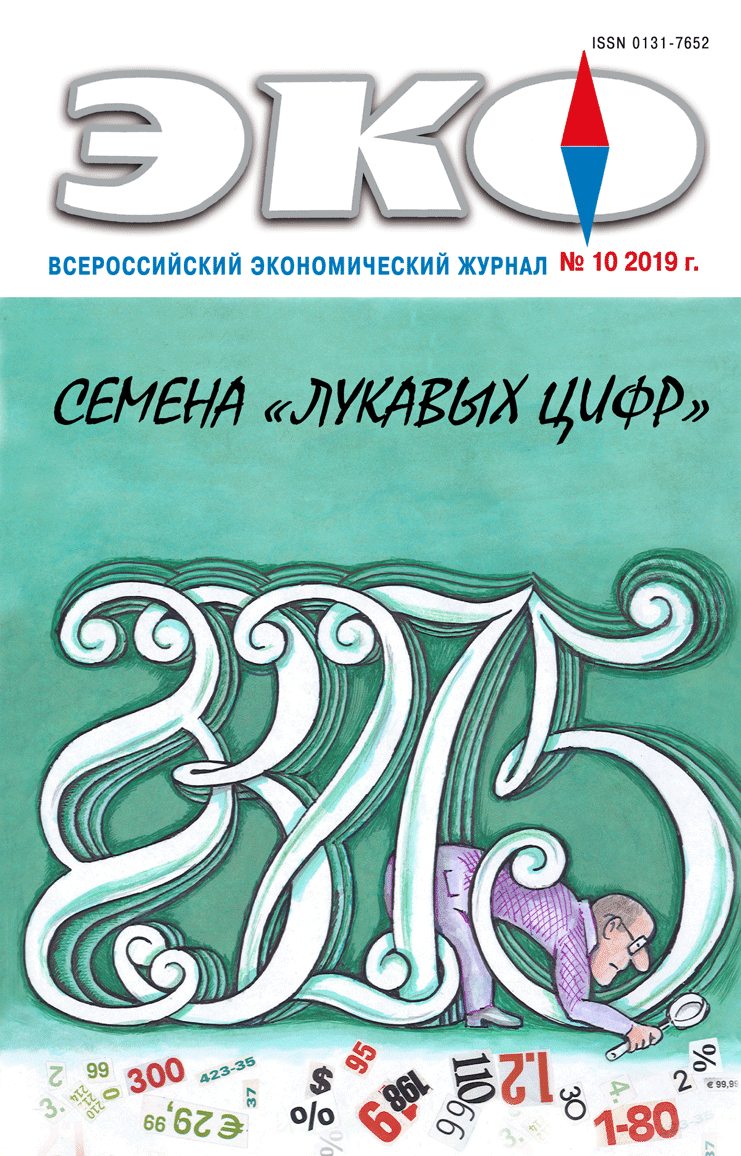Тема номера: Семена лукавых цифр
Published 2019-10-03
Keywords
- official statistics,
- departmental statistics,
- distortion of statistics,
- falsification of statistics
How to Cite
1.
Molyarenko О. Generating State Statistics: A View from «Below». ECO [Internet]. 2019 Oct. 3 [cited 2026 Feb. 15];49(10):8-34. Available from: https://ecotrends.ru/index.php/eco/article/view/3902
Abstract
Official statistical information is regularly publicly criticized for incorrect representation of social, economic and other processes and phenomena. The purpose of this study is to analyze the quality and causes of distorting quantitative data accumulated by the state officials at lower levels – direct executors possessing information about the actual methods of collecting primary and administrative data. More than 270 in-depth interviews with state and municipal officials, heads of municipalities, state employees and municipal institutions were conducted in 13 regions of the Russian Federation. At this level, three basic groups of restrictions on the official statistics were revealed: 1) excessive simplification of reality by the state optics, 2) systematic unintentional shifts in collection and capture of indicators, 3) intentional falsification of statistical indicators.References
- Акерлоф Дж., Шиллер Р. Spiritus Animalis, или как человеческая психология управляет экономикой и почему это важно для мирового капитализма. М.: Альпина Бизнес Букс, 2010.
- Бессонов В. А. Что сохранит для истории современная российская статистика? // Вопросы экономики. 2015. № 1. С. 125–146.
- Кейнс Дж. М. Общая теория занятости// Истоки. Вып. 3. М.: НИУ «Высшая школа экономики», 1998. С. 280–292.
- Кордонский С. Г. Рынки власти. Административные рынки СССР и России. М.: ОГИ, 2006.
- Крашенинникова Ю. А. Медицинская статистика как способ легитимации распределения ресурсов в российской системе здравоохранения // Вопросы государственного и муниципального управления. 2011. № 4. С. 28–42.
- Мизес Л. Человеческая деятельность: трактат по экономической теории. Челябинск: Социум, 2005.
- Моляренко О. А. Формальные и неформальные отношения в информационном обеспечении местного самоуправления (социологический анализ). Дис. … к.с.н. Хабаровск, 2016.
- Нисканен В. А. Особая экономика бюрократии // Вехи экономической мысли. Экономика благосостояния и общественный выбор. Т. 4. СПб.: Экономическая школа. 2004. С. 477–493.
- Пьянкова А. И. Должно ли быть обязательным участие в переписи населения? // Вопросы статистики. 2012. № 10. С. 22–34.
- Рогозин Д. М., Картавцев В. В., Галиева Н. И., Вьюговская Е. В. Методический аудит массового опроса. М.: Дело, 2016.
- Стиглиц Д., Сен А., Фитусси Ж.-П. Неверно оценивая нашу жизнь: Почему ВВП не имеет смысла? М.: Изд-во Института Гайдара, 2016.
- Шклярук М., Скугаревский Д., Дмитриева А., Скифский И., Бегтин И. Криминальная статистика: механизмы формирования, причины искажения, пути реформирования. Исследовательский отчёт. СПб., М.: Норма, Центр независимых социальных исследований и образования, 2015.
- Holz C. A. «Fast, clear and accurate»: How reliable are Chinese output and economic growth statistics? The China Quarterly. 2003. № 173. Pp. 122–163.
- Kalgin A. Implementation of performance management in regional government in Russia: Evidence of data manipulation // Public Management Review. 2016. Vol. 18. № 1. Pp. 110–138.
- Kalgin A., Eliseenko V. Why manipulate? Performance measurement and data manipulation in regional and local government. Working paper WP8/2015/05. Moscow: Higher School of Economics Publ. House, 2015.
- Scott J. C. Seeing Like a State: How Certain Schemes to Improve the Human Condition Have Failed. New Haven, CT: Yale University Press, 1998.
- Terzi A. Keynes’s uncertainty is not about white or black swans// Journal of Post Keynesian Economics. 2010. Vol. 32, № 4. Pp. 559–565.

